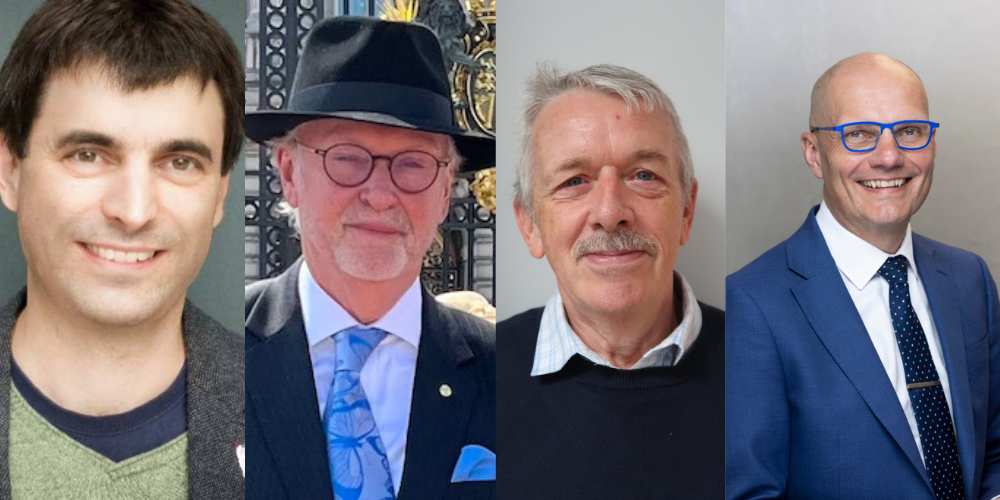Four professors from The University of Manchester have been recognised in the King’s Birthday Honours in recognition of their extraordinary contributions and service.
Professor Ian Hall has been awarded an OBE for his services to public health, to epidemiology and to adult social care, particularly during Covid-19, Professor Richard Wakeford has been awarded an OBE for his for services to the advancement of the science of radiation protection, Professor Paul Klapper has been awarded an OBE for services to viral diagnostic testing, and Professor Paul Howarth has been awarded a CBE for his significant contribution and service to the nuclear industry and to UK research and development (R&D).
The list celebrates individuals who have had an immeasurable impact on the lives of people across the country – such as by creating innovative solutions or driving real change in public life.
Ian Hall is a Professor of Mathematical Epidemiology and Statistics at The University of Manchester. He is a long-standing member of SPI-M (the pandemic disease modelling advisory group) and played a critical role in the operations of this group during the swine flu and Covid-19 pandemics.
During the Covid-19 pandemic he was academic chair of the SAGE working group of Social Care and participated in the SAGE Environmental Modelling Group as well as attending SAGE itself. He was also involved in a number of research projects, including the national core study on transmission (PROTECT) and Project TRACK to understand and control the risks on public transport. He also helped analyse data from a new heat map, providing a national picture of the spread over time.
Since the pandemic, Professor Hall has continued working with UKHSA through an honorary contract, notably with Health Equity Division on vaccination strategies in prison and homeless settings.
His other research interests include the impact of diseases on vulnerable populations and the study of vector-borne infectious diseases and environmental infections, such as Legionnaires Disease.
Professor Wakeford is a member of various committees, including the UN Scientific Committee on the Effects of Atomic Radiation and the International Commission on Radiological Protection. He was a member of the Scientific Advisory Group for Emergencies (SAGE) following the Fukushima nuclear accident in Japan, and for 25 years was Editor-in-Chief of the Journal of Radiological Protection.
Richard completed his PhD in high energy physics at the University of Liverpool in 1978 and worked for British Nuclear Fuels Ltd (BNFL) for nearly 30 years. It was the many challenges faced at BNFL where he developed his skills in radiation epidemiology and radiological protection. He was privileged to work with Sir Richard Doll during this time. After taking early retirement from BNFL, Richard joined the University, initially through an association with Dalton Nuclear Institute and then joining COEH.
Throughout his career, Professor Klapper has been at the forefront of several key developments of viral diagnostic testing. Notably, he worked with the Greater Manchester Hepatitis C testing strategy, developing community-based testing methods to aid control of the HCV pandemic. In 1981, he became an NHS Clinical Scientist, working in both Manchester and Leeds as a Consultant Clinical Scientist. Ten years later, in 1991 became a Fellow of the Royal College of Pathology.
On retiring from the NHS in 2012, Professor Klapper joined The University of Manchester as a Professor of Clinical Virology. Early in 2020, he volunteered to help with establishment of large scale Covid-19 testing and became the clinical lead for the Alderley Park testing facility. He also served as a Clinical Advisor for testing with the Department of Health.
Professor Klapper continues to conduct vital research in blood-borne virus infection and in congenital human cytomegalovirus infection.
Professor Howarth has had a distinguished career working in and for the nuclear sector, building a reputation as one of the leading figures in the UK nuclear sector and around the global industry. After completing his degree in Physics and Astrophysics and PhD in Nuclear Physics, he started his career working on the European Fusion Programme. Early in his career he was awarded a prestigious Royal Society Fellowship to work in Japan on their nuclear programme. On returning to the UK he continued to work on nuclear fission leading the UK’s advanced reactor programme while working at British Nuclear Fuels, co-founding the Dalton Nuclear Institute at the University and working closely with UK Government on building the case for new nuclear build.
Professor Howarth was appointed CEO for the National Nuclear Laboratory (NNL) in 2011 following its creation as a public corporation, having been instrumental in its establishment from British Nuclear Fuels Limited (BNFL). During his tenure as CEO, NNL has been transformed into a successful business and a true national laboratory, delivering profits to reinvest into nuclear science and technology and critical support to nuclear organisations in the public and private sectors.
The birthday honours are awarded by the King following recommendations by the prime minister, senior government ministers, or members of the public.
The awards recognise active community champions, innovative social entrepreneurs, pioneering scientists, passionate health workers and dedicated volunteers who have made significant achievements in public life or committed themselves to serving and helping Britain.
To see the full Birthday Honours List 2024, visit:
